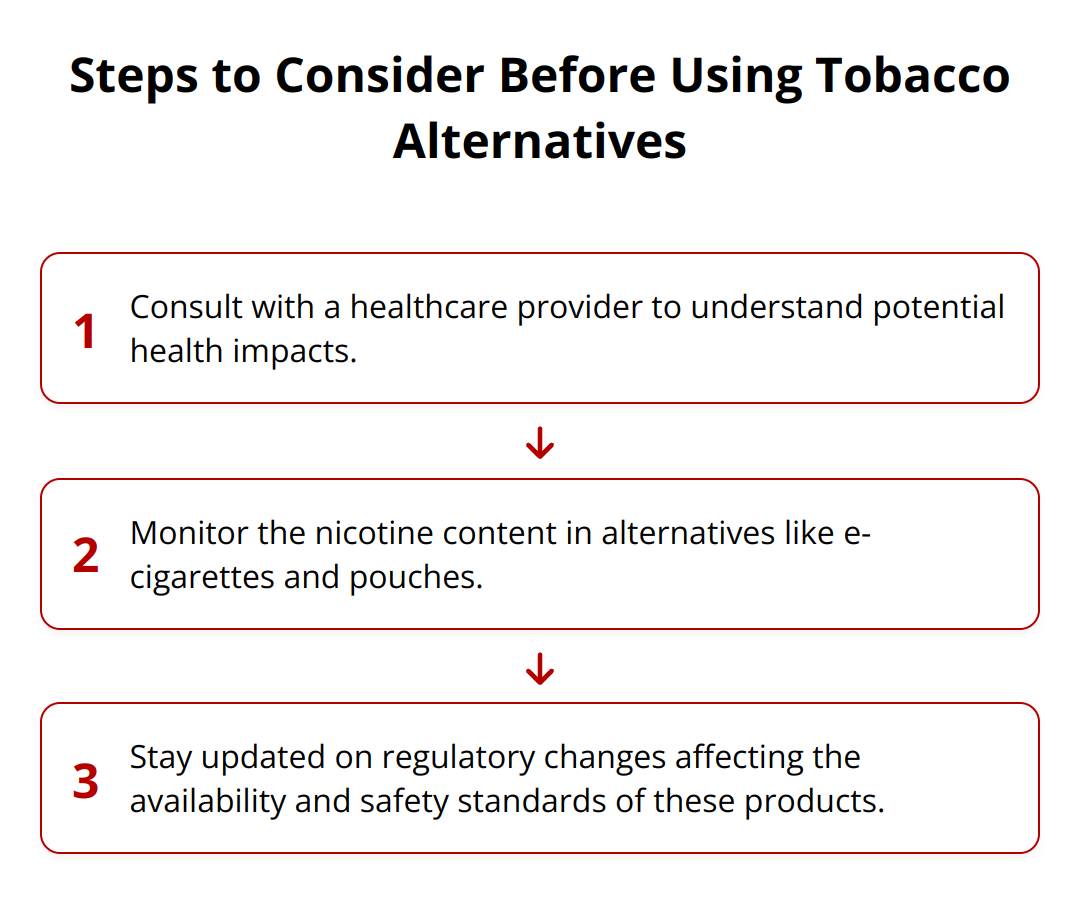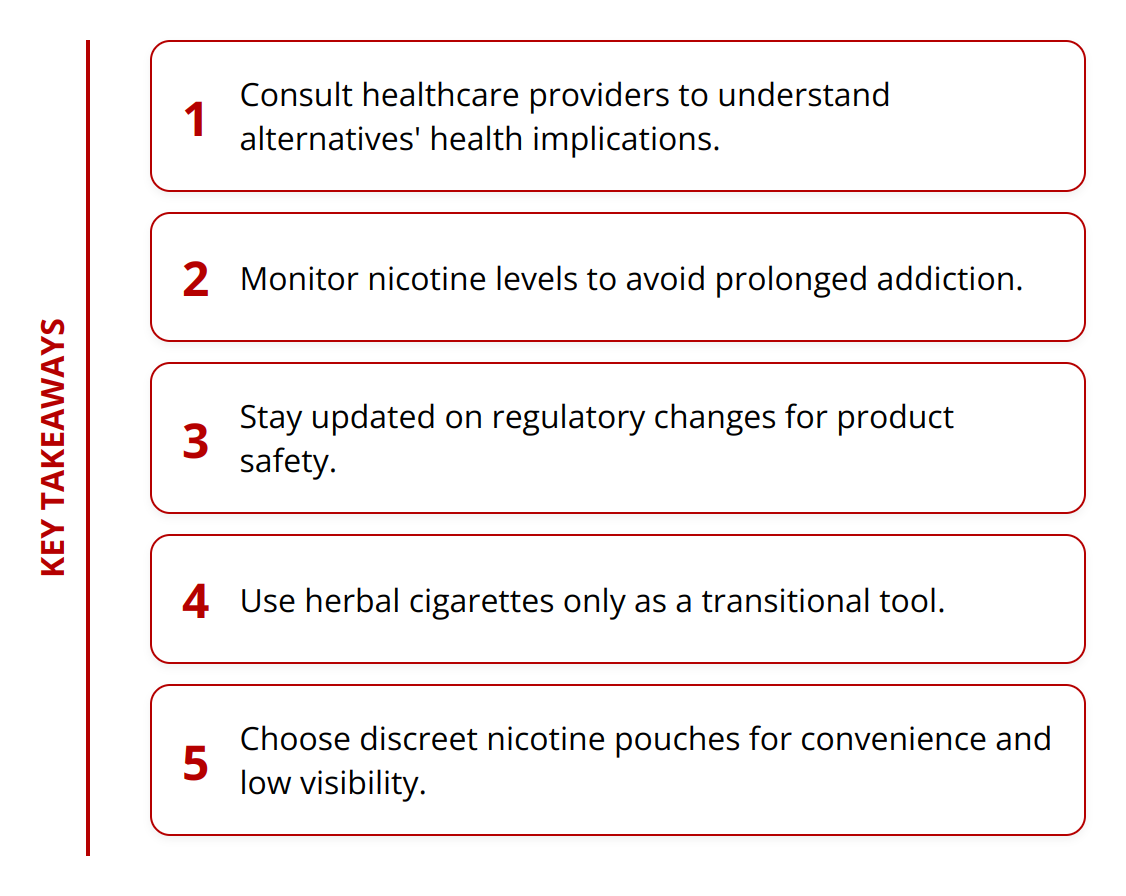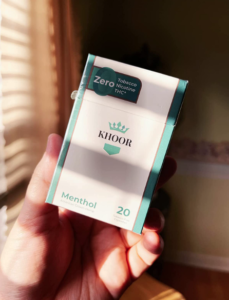
Herbal Smoking Wellness: All You Need to Know
Explore the benefits and tips of herbal smoking wellness with information on health impacts, botanical choices, and DIY blends.

Tobacco alternatives are gaining spotlight as people seek healthier lifestyles. At KHOOR, we explore these options to understand their benefits and drawbacks.
We’ll look into various products, from e-cigarettes to nicotine pouches. Learn about their health impacts, market trends, and what the future holds.
Tobacco alternatives have surged in popularity as individuals look for healthier habits. Each option comes with its unique features, setting it apart from traditional tobacco products. Here’s a closer look at these alternatives, their differences from conventional tobacco, and current market dynamics.
Common Tobacco Alternatives
There are various options available for those seeking to move away from traditional tobacco. These include:
Differences from Traditional Tobacco
Tobacco alternatives differ notably from traditional tobacco products. Here are some key points:

Current Market Trends
The market for tobacco alternatives is rapidly evolving. Some notable trends include:
Understanding these products and market trends can help users make informed decisions. For those interested in specific products, you can explore more about herbal cigarettes.
The exploration of tobacco alternatives is essential in the global effort to reduce tobacco consumption and its associated health risks.
The health impacts of tobacco alternatives are a critical consideration for anyone looking to switch from traditional tobacco products. Understanding these impacts can help in making informed choices for a healthier lifestyle.
Comparative Health Risks and Benefits
E-cigarettes, nicotine pouches, and herbal cigarettes present different health profiles compared to traditional cigarettes. E-cigarettes eliminate many harmful chemicals found in tobacco smoke due to the absence of combustion. According to Public Health England, e-cigarettes are estimated to be 95% less harmful than traditional cigarettes.
Nicotine pouches, being smokeless and tobacco-free, sidestep many of the risks associated with smoking. However, they still deliver nicotine, which can affect cardiovascular health. A study in the American Journal of Preventive Medicine highlights that nicotine can increase heart rate and blood pressure.
Herbal cigarettes, while free of nicotine and tobacco, still produce tar and carbon monoxide when burned. It’s a step towards reducing nicotine addiction but not completely free of health risks.

Long-term Health Studies and Findings
Long-term studies on tobacco alternatives are still evolving. However, available research provides some insights:
Regulatory Insights and Public Health Policies
Various countries have begun regulating tobacco alternatives to minimize potential harm. For instance, the FDA in the United States has mandated the premarket authorization for e-cigarettes, ensuring these products meet safety standards before they reach consumers. Europe has set strict regulations for nicotine pouches, governing their nicotine content and marketing.
Public health policies increasingly aim to equalize the regulation of all tobacco and nicotine products. The goal is to curb overall tobacco use and protect public health. The World Health Organization advocates for uniform regulation to prevent regulatory gaps that might lead to increased consumption of alternative tobacco products.
Practical Tips for Users
For those considering tobacco alternatives, here are some practical tips:

For further information, you can read more about herbal cigarettes and their benefits and drawbacks.
Electronic Cigarettes and Vaping
Electronic cigarettes, commonly known as e-cigarettes or vapes, have become a favorite among those trying to quit smoking. These devices heat a liquid, usually containing nicotine, into a vapor. Unlike traditional smoking, there’s no combustion, which reduces exposure to harmful chemicals. A Public Health England study found e-cigarettes to be 95% less harmful than cigarettes. However, it’s important to be cautious about the nicotine levels in these liquids to avoid prolonged addiction.

Heat-Not-Burn Products
Heat-not-burn (HNB) products are another innovative alternative. They heat tobacco to generate an aerosol rather than smoke. This method reduces the release of harmful chemicals typically found in traditional cigarette smoke. According to a study from the U.S. FDA, HNB products can produce fewer toxins than burning tobacco. But they still deliver nicotine and should be approached with caution, particularly for those with cardiovascular concerns.
Herbal Cigarettes and Nicotine Pouches
Herbal cigarettes offer a unique tobacco and nicotine-free smoking experience. Comprising a mixture of herbs like mint and chamomile, these cigarettes help smokers move away from nicotine dependency. However, it’s crucial to recognize that even herbal cigarettes produce tar and carbon monoxide when burned. Their use should be transitional rather than permanent.
Nicotine pouches are discreet, smokeless, and do not contain tobacco. They offer a convenient way to consume nicotine without the stigma of smoking. These pouches have become especially popular in Europe and North America for their ease of use and low visibility. Be mindful of potential cardiovascular risks associated with nicotine. A study highlighted in the American Journal of Preventive Medicine shows nicotine can elevate heart rate and blood pressure.
Practical Tips for Using Tobacco Alternatives

For more information on specific alternatives, you might find this post about the benefits of tobacco-free cigarettes useful.
Tobacco alternatives present varied options for those looking to move away from traditional tobacco. Products like e-cigarettes, nicotine pouches, herbal cigarettes, and heat-not-burn items offer unique features and health profiles. E-cigarettes heat liquids to create vapor, nicotine pouches are smokeless and spit-free, while herbal cigarettes provide a tobacco-free option.

Market trends highlight significant growth, especially in e-cigarettes and nicotine pouches. The global e-cigarette market, valued at $15.6 billion in 2020, is projected to grow rapidly. Nicotine pouches are gaining popularity in Europe and North America due to their convenience and discreet use.
The health impacts of these alternatives vary. E-cigarettes are estimated to be 95% less harmful than traditional cigarettes, though long-term studies are still ongoing. Nicotine pouches eliminate smoke but still pose cardiovascular risks. Herbal cigarettes help reduce nicotine addiction but emit tar and carbon monoxide when burned.
Public health policies are increasingly regulating these alternatives to prevent misuse and ensure safety. In the U.S., the FDA mandates premarket authorization for e-cigarettes, ensuring they meet safety standards.
Practical tips for using tobacco alternatives include consulting healthcare providers, monitoring nicotine intake, and staying updated on regulations. For those interested, explore more about herbal cigarettes.
At KHOOR, we provide a health-conscious alternative with our premium, all-natural herbal cigarettes. Available in flavors like Original, Menthol, Vanilla, and Berry Blue, KHOOR offers a satisfying smoking experience without tobacco or nicotine. Try our 4-pack flavor sampler for a taste of what we offer.

Explore the benefits and tips of herbal smoking wellness with information on health impacts, botanical choices, and DIY blends.

Explore how KHOOR supports nicotine replacement with herbal cigarettes, success rates, and user stories for a healthier, smoke-free life.

Explore the benefits of quitting tobacco & nicotine with healthy alternatives. Improve your health and well-being with tips and data-backed advice.

Achieve your quit smoking goals with KHOOR’s supportive approach. Discover benefits, statistics, and practical tips for a healthier life.

Explore practical tips to smoke without nicotine, including product recommendations and real-life statistics to support your healthier lifestyle choices.

Explore tobacco-free alternatives with KHOOR. Learn about options like herbal cigarettes, nicotine pouches, and vaping for a healthier lifestyle.